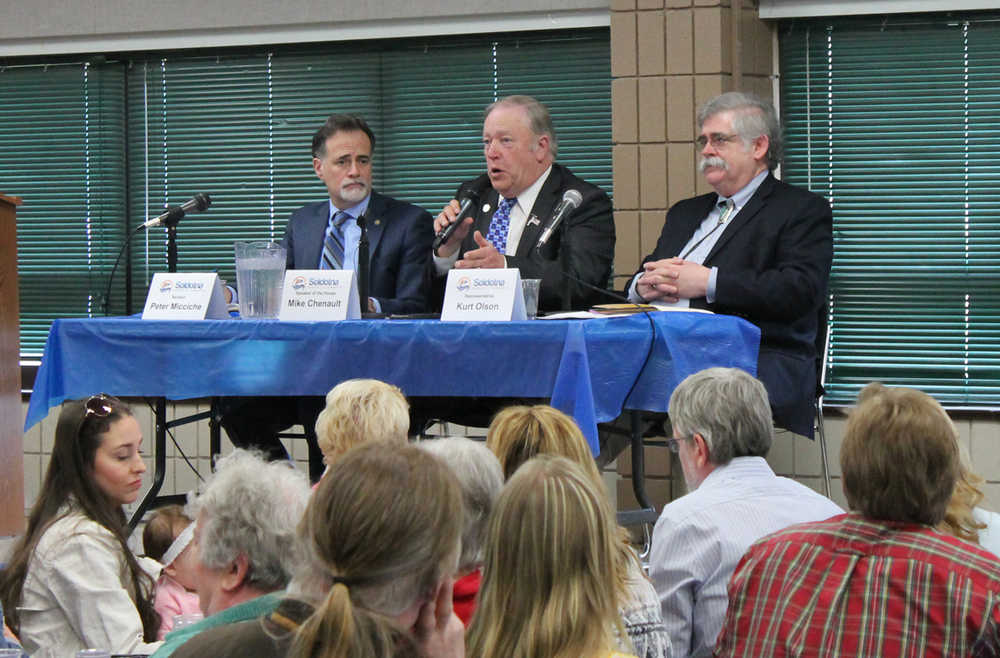With the Alaska Legislature on recess until the May 12 resumption of a special session called by Gov. Bill Walker, three Kenai Peninsula legislators gave constituents a legislative update on Tuesday in Soldotna.
Speaker of the House Mike Chenault, R-Nikiski, Rep. Kurt Olson, R-Soldotna, and Sen. Peter Micciche, R-Soldotna, spoke at the lunch event organized by the Soldotna and Kenai Chambers of Commerce, and took questions from the audience afterward.
At the opening of his talk, Olson named four priority issues awaiting the delegation when the session resumes: Medicaid expansion, education, the completion of a fully-funded state budget, and support for the Alaska LNG project. The issues of education and the budget are tied together through negotiations between the Republican majority, to which all three delegates belong, and the Democratic house minority over funding for the state’s Fiscal Year 2016 budget.
“We have a budget that has passed,” Micciche said. “We’re just working on a little bit of a funding problem.”
The budget that passed the Legislature is still contentious because it needs a $3.2 billion withdrawal from the $10 billion Constitutional Budget Reserve, an action requiring a three quarters majority of both houses. The Republican majority in the Senate has enough members to approve the withdrawal, but the House Democratic minority is sufficient to block it, forcing negotiation over the minority’s demand to restore $48 million of education funding, among other items.
Micciche said that the Senate finance committee, of which he is a member, met on Monday to discuss a compromise budget submitted by the governor, which he said included unacceptable increases in spending.
“We’re kind of scratching our head with this new budget,” Miccicie said. “We need to find a deal with the old budget.”
One provision in the governor’s proposed budget gives funding for an expansion of Medicaid, another demand that the three delegates said could not be met under current financial constraints.
Olson said that he believed Medicaid expansion would happen eventually, but that it should not be done in this legislative session because of uncertainty over the federal readiness to provide funding and problems with Alaska’s current Medicaid system.
“We still don’t have a system that is working,” Olson said. “We have providers that are not being billed, we have patients whose billing is being screwed up, we’re suing Xerox who had put together the software system for us, and it’s a mess. We anticipate that with any kind of luck at all, it should be sorted out later this year, but it’s not going to happen this month.”
Olson said the Alaska LNG project was “a priority because at this point in time — unless we want to tax ourselves or go into the permanent fund — that’s only source of major revenue that’s going to be coming on-stream in the next few years.”
Chenault said the Alaska LNG Project was the most viable proposal for an natural gas pipeline because the state, which owns a share of the gas that would be transported in the pipeline, would also own a share of the pipeline itself.
“The biggest problem that industry has had over the years in putting together a pipeline that works is that they were going to pay 100 percent of the cost but they were only going to use 75 percent of the throughput of that line because the state of Alaska has 25 percent ownership,” Chennault said.
He said that he supports the Alaska LNG project over expanding the Alaska Standalone Pipeline, which Walker endorsed earlier this year as a back-up to the Alaska LNG pipeline.
“The governor believes we need a back-up plan, and his back-up plan is a competing project,” Chenault said. “When you build a pipeline the same size that can carry roughly the same amount of gas, you can call it a back-up plan, you can call it optimizing — I’ve heard it called half-a-dozen different things. It’s a competing project, and competing projects bring uncertainty. And uncertainty in a $65 billion project is not good for the project. We need to push forward as far and hard as we can with Alaska LNG.”
Returning to the subject of the budget at the end of his speaking period, Olson urged constituents to submit their opinions regarding the state’s financial problems.
“If you have any ideas call our offices because we could be missing any number of things that we haven’t looked at yet,” Olson said. “The more people give us feedback on the direction we can go the better likelihood that when we have to make cuts next year that we’ll doing it in a satisfactory manner.”
Reach Ben Boettger at ben.boettger@peninsulaclarion.com.

